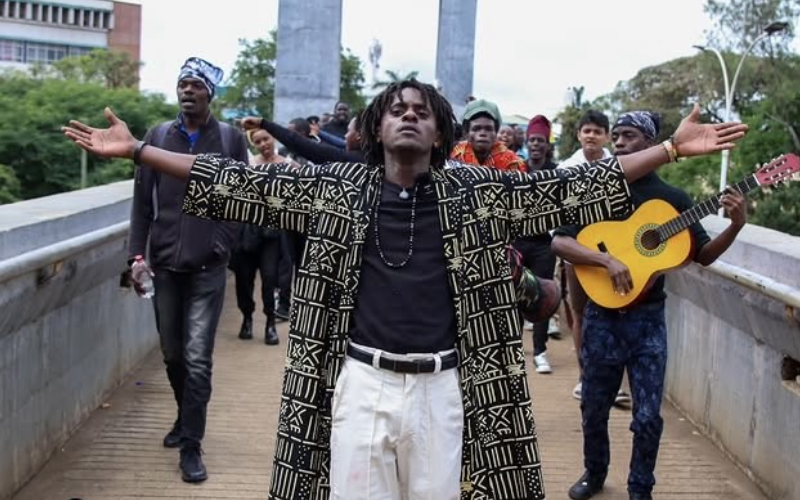Last Sunday, art enthusiasts and onlookers followed actor and storyteller Thuita Mwangi through the streets of Nairobi to hear its stories.
From the Kenya National Theatre (KNT) to the Dedan Kimathi monument on Kimathi Street, his latest street theatre performance under Story za Thuita production was a history lesson and a public occasion in one.
This performance is part of the annual two-week Kenya International Theatre Festival (KITFEST) that ends on November 16. The three-hour walk featured his storytelling performance, supported by stunt work, puppetry, music, and dance from other artists.
The journey began at the KNT, which was delayed slightly by rain, and wound its way through the city centre, with each stop revealing historical intrigues.
At the KNT, the first enactment was of Mwangi’s grandfather, who went to World War II. The walk then proceeded to the Norfolk Hotel, directly opposite the theatre, where the animated storyteller told stories about the apartheid that occurred at the premises.
Then at the Central Police Station, he remembered those who died right there outside in 1922, like political activist Mary Muthoni Nyanjiru. The people were protesting against the arrest of Harry Thuku, who was fighting for human rights.
By the time the performance reached the Dedan Kimathi monument, the audience had grown. It was an immersive experience, where people wore headsets to listen to Mwangi narrate the story of Dedan Kimathi just a few minutes before his arrest in Nyeri Forest.
Afterwards, they asked questions, added information, and responded to his questions to expand on the story.
“That’s the beauty of street theatre; it’s a cultural thing that brings people together,” Mwangi says.
Today, November 16, he performs again with new stories as KITFEST ends. His background in tourism management influenced his approach to taking people on tours around city landmarks and recounting the histories behind them.
“I didn’t want to tell stories about jungles or safaris but about the places we pass every day but don’t know much about, and combining that with art,” he explains.
As a lover of stories and history, it all started when he would share stories with his friends when they walked around town, and they jokingly dubbed it Story za Thuita. He formally founded the initiative in 2023, and it is now in its sixth edition.
He captures themes such as colonialism, social justice, women’s empowerment, ethnicity, culture, and the celebration of war heroes. He starts by choosing a story he plans to tell and then places himself in the space, with the environment being part of the narrative.
“I always wanted to produce unique content. The hunger to tell stories, especially to the younger generation who don’t know much about our history. I want to revolutionise theatre,” he says.
He also acts on stage, with his latest work being a play titled Locked In in late October. Street theatre is a much more affordable practice for him, as it relies on storytelling rather than production design.
Without the enhancements of lighting, set, and sound designs of a traditional theatre, he depends on his voice and creativity to captivate the audience.
“Street theatre is my gym. It sharpens my voice, spirit, resilience, agility, and storytelling skill. That’s where I flex. It is where I train myself as a performer and use what I learn in my acting,” he says.
Mwangi allows his audience to be a part of the story, and he recalls instances where street children joined in. One of his memorable moments is during KITFEST 2023, when a German lady from the audience volunteered to act as Mary Muthoni Nyanjiru. She spoke in fluent Kikuyu and translated into English, much to the surprise of everyone.
His performances have also come with challenges, like some members of the crowd seemingly disengaged, interruptions from non-audience members, and lack of funding.
Mwangi aims to revive the culture of storytelling traditions that is as old as time. He says there haven’t been many storytellers in the previous generations, and there are far fewer in his Generation Z. “Traditionally, we communed through storytelling, and now my team and I are creating awareness of our history,” he says.
Two of the stories that are close to his heart are the apartheid narrative at the Norfolk Hotel and the Dedan Kimathi story, which he ironically wrote during happy moments.
Photos: Courtesy
